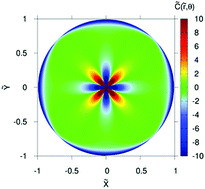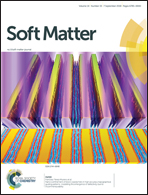Long-range stress correlations in viscoelastic and glass-forming fluids
Abstract
A simple and rigorous approach to obtain stress correlations in viscoelastic liquids (including supercooled liquid and equilibrium amorphous systems) is proposed. The long-range dynamical correlations of local shear stress are calculated and analyzed in 2-dimensional space. It is established how the long-range character of the stress correlations gradually emerges as the relevant dynamical correlation length  grows in time. The correlation range
grows in time. The correlation range  is defined by momentum propagation due to acoustic waves and vorticity diffusion which are the basic mechanisms for transmission of shear stress perturbations. We obtain the general expression defining the time- and distance-dependent stress correlation tensor in terms of material functions (generalized relaxation moduli). The effect of liquid compressibility is quantitatively analyzed; it is shown to be important at large distances and/or short times. The revealed long-range stress correlation effect is shown to be dynamical in nature and unconnected with static structural correlations in liquids (correlation length ξs). Our approach is based on the assumption that ξs is small enough as reflected in weak wave-number dependencies of the generalized relaxation moduli. We provide a simple physical picture connecting the elucidated long-range fluctuation effect with anisotropic correlations of the (transient) inherent stress field, and discuss its implications.
is defined by momentum propagation due to acoustic waves and vorticity diffusion which are the basic mechanisms for transmission of shear stress perturbations. We obtain the general expression defining the time- and distance-dependent stress correlation tensor in terms of material functions (generalized relaxation moduli). The effect of liquid compressibility is quantitatively analyzed; it is shown to be important at large distances and/or short times. The revealed long-range stress correlation effect is shown to be dynamical in nature and unconnected with static structural correlations in liquids (correlation length ξs). Our approach is based on the assumption that ξs is small enough as reflected in weak wave-number dependencies of the generalized relaxation moduli. We provide a simple physical picture connecting the elucidated long-range fluctuation effect with anisotropic correlations of the (transient) inherent stress field, and discuss its implications.



 Please wait while we load your content...
Please wait while we load your content...